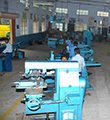
A Diploma in Electrical and Electronics Engineering is a technical program that provides students with a strong foundation in electrical and electronics principles and applications. The program typically spans three years and covers a range of subjects related to electrical systems, electronics, control systems, and instrumentation. Here are some common elements of a Diploma in Electrical and Electronics Engineering course and potential career opportunities:




Many diploma programs include a project component where students apply their knowledge and skills to design and implement electrical and electronics systems.
Some programs may include an industrial training or internship component, allowing students to gain practical experience in the electrical and electronics industry.
Depending on the program, students may have the option to choose elective subjects in areas such as renewable energy, robotics, or advanced control systems.
Design and maintain electrical systems for various applications, including power generation and distribution.
Design and develop electronic systems and components for applications such as telecommunications and control systems.
Work on the planning, design, and maintenance of power generation, transmission, and distribution systems.
Design and implement control systems for automation and industrial processes.
Develop and maintain instruments for measuring and controlling processes in various industries.
Design and implement power electronic systems for applications such as motor drives and renewable energy systems.
Focus on the design and implementation of systems that harness renewable energy sources such as solar and wind power.
Oversee the maintenance and repair of electrical systems and equipment.
Design and maintain communication networks, including both wired and wireless systems.
Work on the design and implementation of automated systems and robotics in industrial settings.
Provide on-site technical support and maintenance services for electrical and electronics systems.
Start your own business in areas such as electrical contracting, electronics manufacturing, or consulting.
Pursue higher education, such as a Bachelor's degree in Electrical and Electronics Engineering or related fields, for broader career opportunities.
 About Course
About Course
 Course Details
Course Details
 Laboratory Work
Laboratory Work
 Project Work
Project Work
 Industrial Training
Industrial Training
 Elective Subjects
Elective Subjects
 Career Opportunities
Career Opportunities








